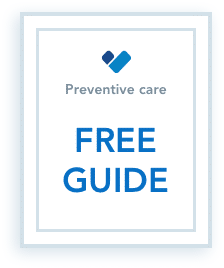What’s the difference between an HMO and PPO plan?
When you compare your health insurance options on the Marketplace (aka Obamacare plans or Affordable Care Act plans), most people focus on the monthly premium cost. However, there are other important factors to consider when choosing a plan. One of them is deciding between an HMO and PPO plan – and identifying what type of services you want within your provider network. Here’s a quick orientation to help you make your decision plus a free guide to HMOs and PPOs that you can save and refer back to later.
First, to see what types of plans are available to you, enter your zip code below. This will also show you if you’re eligible for Medicaid and how much you might be eligible for in Marketplace subsidies. You can also call (872) 228-2549 for assistance applying for health insurance.
Defining two important terms
1. What’s a provider network?
This term refers to the group of healthcare providers (doctors, pharmacies, hospitals, therapists, etc.) whose healthcare services are covered by your health insurance plan. A larger provider network means you have more choices when it comes to choosing a primary care provider or a specialist. This can be important if you need medical care while you’re away from your home. Or if you want to have more options when it comes to seeing a specialist.
2. What are referrals and how do they work?
Different types of networks also have different rules about whether you can contact a specialist on your own. Or whether your primary care physician is the gatekeeper who decides if you need a specialist. Of course, you are free to pick up the phone and make an appointment with anyone you’d like. However, it’s important to know a health plan that requires a referral won’t cover the cost of the appointment without your primary care physician’s seal of approval, first. With their seal of approval, you can expect to see lower costs.
HMO plans (Health Maintenance Organization)
An HMO health insurance plan gives you access to medical providers and hospitals within its network. The network is a collection of medical providers and healthcare facilities that have met the standards of the insurance company and have agreed to reduce their rates for network members. Medical coverage is restricted to providers who are in-network. If you visit a doctor or hospital out-of-network, your insurance company will not cover any medical expenses and most likely you will have out-of-pocket costs.
As an HMO member, you need to choose a Primary Care Provider or “gatekeeper” who will refer you to network specialists (a cardiologist, dermatologist, pathologist, etc.). Your Primary Care Provider serves as your health advocate — someone who will check to see what medical issues you have and refer you to appropriate specialized care providers. That way, you can be sure that you are visiting the right type of doctor every time you have a potential medical issue.
HMO plans typically have lower monthly premiums than PPO plans.
An HMO plan is a good choice if you:
- Would like a central doctor who will serve as a coordinator for specialist care
- Are not tied to particular doctors that are outside of the HMO network
- Don’t typically need to access network services when you’re out of town
- Are looking for a lower monthly premium within a certain insurance company
PPO plans (Preferred Provider Organization)
With a PPO health insurance plan you have more flexibility in choosing a doctor or hospital. Like an HMO, a PPO plan has network providers that will be covered under your plan’s benefits. You can also see doctors outside of the PPO network but it’s likely you have to pay more for these visits. There is no mandatory Primary Care Provider and you can see specialists that you choose without needing a referral.
PPO plans typically have higher monthly premiums than HMO plans.
A PPO plan is a good choice if you:
- Are often out of your provider’s area of medical coverage
- Desire more flexibility when selecting specialists and accessing medical services
- Want to continue seeing a doctor who is outside of the plan’s network
Pro Tip: Wondering how much each plan will cost per month? Want to compare plans with lower premiums vs. higher premiums? Use HealthSherpa’s enrollment tool to compare plans and prices.
Besides HMO and PPO plans, there are a couple of other options to consider:
POS plans (Point of Service)
A POS plan uses a primary care physician to refer you to both in-network and out-of-network providers. However, it will normally cost more to see providers who are out-of-network. This type of plan is considered an HMO plan with more out-of-network coverage.
A POS plan is a good choice if you:
- Would like a primary care provider to coordinate your specialist care
- Would like the option of seeking out-of-network care
EPO plans (Exclusive Provider Organization)
An EPO has a network of doctors and hospitals that are used exclusively. You don’t need a primary care provider to refer you to specialist care. In this sense, an EPO plan is similar to a PPO but with a more limited network. Let’s say you schedule an office visit with a specialist outside of your network, this service will not be covered by your EPO plan.
An EPO plan is a good choice if you:
- Prefer choosing and visiting specialist doctors freely
- Are comfortable seeking care in a close-knit network of providers
- Typically do not need medical care when out of town
How to decide which type of plan is best for you
Don’t worry if you’re still feeling confused. Asking lots of questions will help you sort out your choices. Here are a few to get you started:
- Do I want lots of choices and fewer restrictions when choosing a provider?
- Do I go out of town often and want coverage while traveling?
- What is my out-of-network deductible vs. in-network deductible?
What are all of my health insurance options?
- Marketplace/Obamacare plan. You can enroll in a Marketplace health insurance plan, also known as Obamacare or Affordable Care Act insurance. See plans and prices here.
- Medicaid. You also may be eligible for Medicaid, depending on your income. You can see if you’re eligible and apply here.
- COBRA. If you’ve been laid off recently, you usually have the option of COBRA, where you pay the full premium of the same insurance your employer purchased for you. COBRA is typically much more expensive than Marketplace insurance, but it allows you to continue the coverage you already had. Learn more about comparing COBRA with Obamacare health insurance.
- Medicare. Once you turn 65, you’re eligible for Medicare. Call us to enroll at (855) 677-3060.
Enter your zip code below to see available plans in your area and to see what kinds of savings you might qualify for, or call (872) 228-2549 for assistance applying for health insurance.
Enrollment dates and deadlines
Open Enrollment for Marketplace plans starts on November 1st and ends on January 15th in most states. However, if you’re looking to enroll outside of Open Enrollment, you must experience a Qualifying Life Event. You can find the entire list here. Grab our guide to enrolling in Marketplace insurance to learn more.
If you’re eligible for Medicare and enrolling in a Medicare Advantage plan, you can do so during the Annual Enrollment Period (October 15th–December 7th). During this time you can also switch Medicare Advantage plans, switch back to Original Medicare, enroll in a Part D prescription drug plan, plus more.
You can enroll in Medicaid year-round.
Before you go, don’t forget to grab our free guide to help you choose a plan.














… [Trackback]
[…] Informations on that Topic: healthsherpa.com/blog/difference-between-hmo-and-ppo/ […]
Some really superb info.
Thank you.
A feel more confident in my understanding for the difference between PPO and HMO.
The information is very clear and gave enough details for me to understand which helps
to make a decision.
Thanks for letting us know, Michelle. I’m glad it helped.
[…] Learn more about which plan is right for you here. […]
[…] insurance plans to find the right one for you and your family. Consider things such as whether an HMO or PPO plan will be better and which metal tier plan makes sense for […]
Keep up the great work guyz.
Thanks for your writing. I would love to say that a health insurance agent also works best for the benefit of the particular coordinators of any group insurance coverage. The health agent is given a directory of benefits sought by individuals or a group coordinator. What a broker does indeed is try to find individuals or coordinators which best fit those needs. Then he offers his referrals and if each party agree, this broker formulates a legal contract between the two parties.
[…] and forecasting your own medical needs for the year will help you decide whether you need an HMO, a PPO, or another type of plan. It’ll also help you decide what level of coverage you need (there are five tiers if you get ACA […]
[…] you typically would only be able to use your health insurance out-of-state if you have a PPO or POS plan that offers out-of-network coverage. If you have a multi-state plan, you may have in-network providers across a region or even […]
[…] can also learn about the different types of networks, like HMOs and PPOs, here. […]
Do any of these health coverages help with weight lost surgeries
You’d have to check with the individual plan. You can also call us for help!
That is a very good tip particularly to those fresh to the blogosphere. Short but very precise info… Thank you for sharing this one. A must read article!
go ahead and give you a shout out from Kingwood Tx!
Hey there! I’m at work browsing your blog from my phone! Just wanted to say I love reading through your blog and look forward to all your posts! Carry on the superb work!
I can’t seem to be able to change my choice of network to ppo, epo, or pos….that’s what I want to look at.
When you’re looking at plans on our site, there’s a checkbox on the left where you can filter by type of plan. That said, there are some areas where you may only have access to one type of plan.